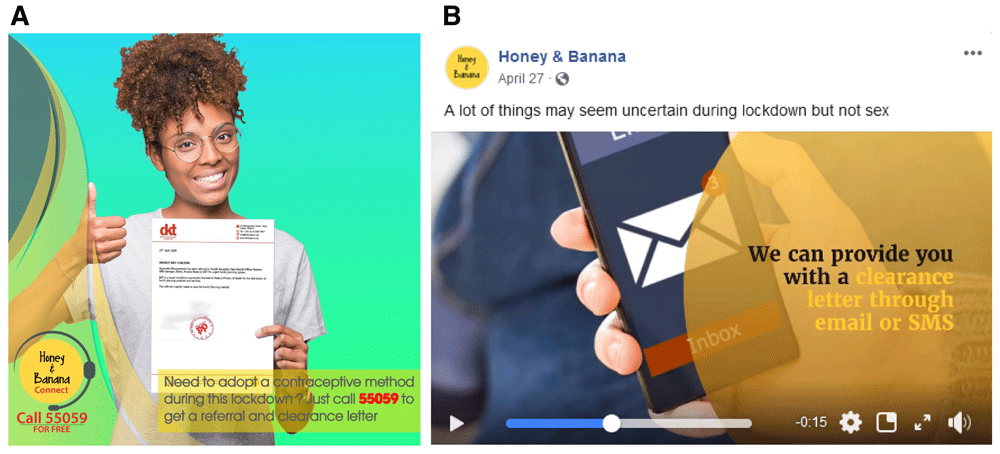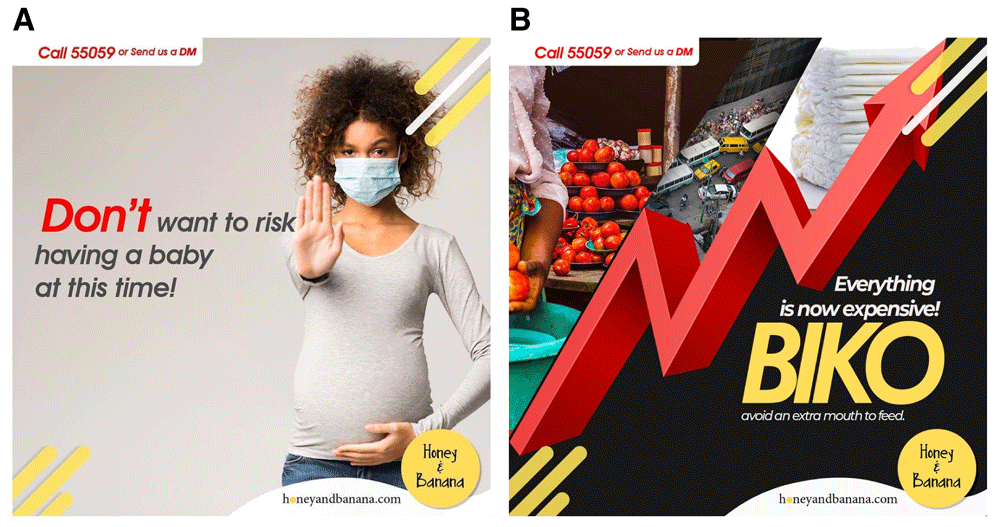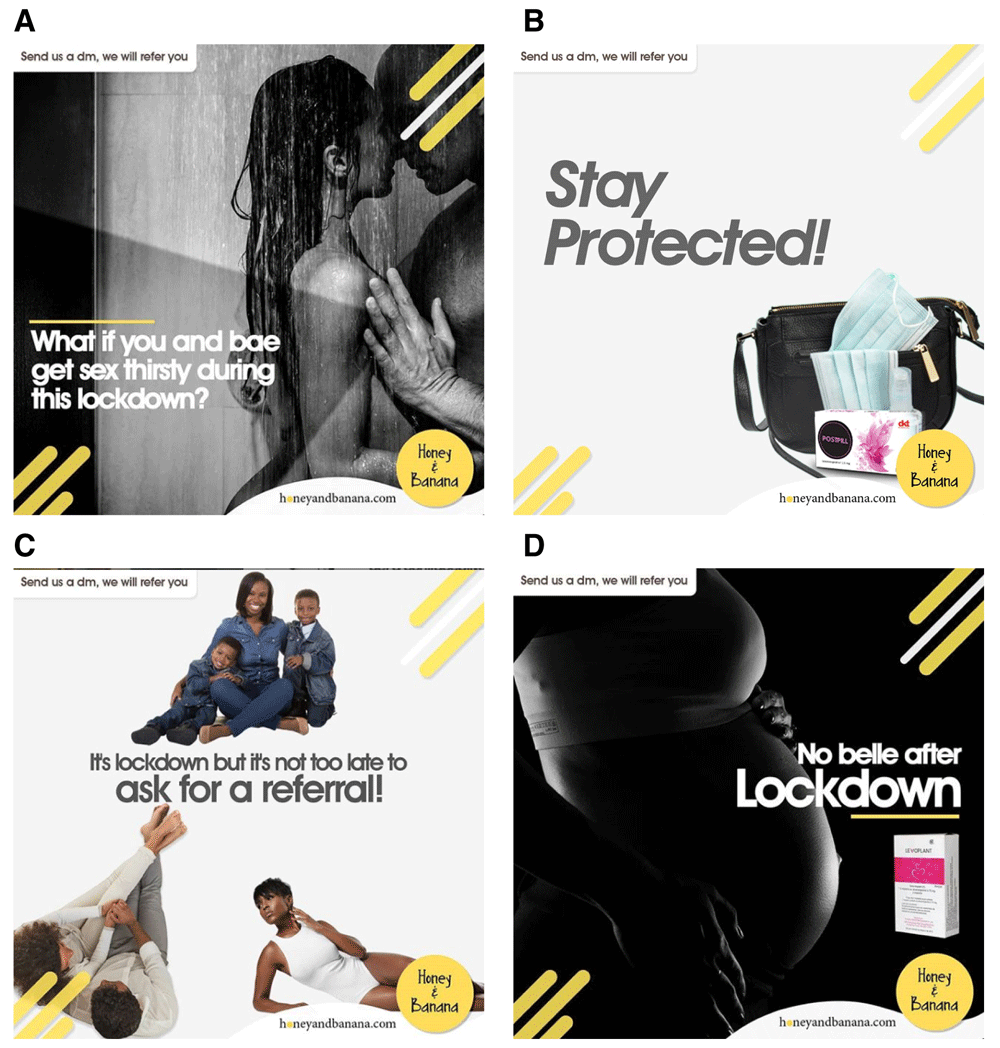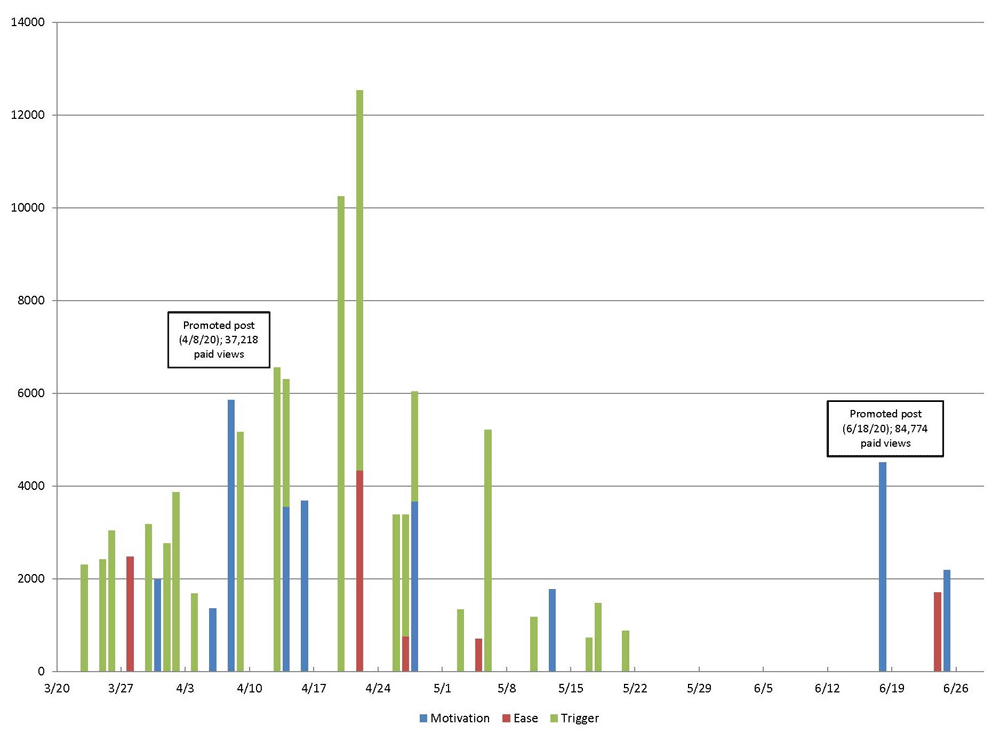Keywords
Social Marketing, Theory of Change, Fogg Behavior Change Model, COVID-19, Family Planning, Nigeria
This article is included in the Coronavirus (COVID-19) collection.
Social Marketing, Theory of Change, Fogg Behavior Change Model, COVID-19, Family Planning, Nigeria
The views expressed in this article are those of the authors and not of their respective organizations or funding bodies. Publication in Gates Open Research does not imply endorsement by the Gates Foundation.
The rapid increase in the number of coronavirus infections and the corresponding increase in morbidity and mortality are well documented (WHO, 2020a). There has been a lot of concern that the pandemic can strain the health system, which can create shortages in hospital services needed by patients with other severe illnesses. Recently, there has been increasing attention paid to the effect of the pandemic on people’s use of routine health services, such as family planning services (FP2020, 2020; Nanda et al., 2020; Weinberger et al., 2020; WHO, 2020b).
Lockdown regulations, and other restrictions on movement make it difficult for people to visit health providers to obtain information about family planning, to discuss side-effects or problems they are experiencing with their current method, or even to obtain new family planning supplies (e.g., to renew their contraceptive injection). The inability to earn income during the lockdown may also make family planning products and services unaffordable. As a result, the pandemic may cause unintended interruptions in contraceptive use. It may also prevent non-users from adopting a contraceptive method. The effects may persist after the lockdown restrictions end, given that fear of coronavirus infection may make people reluctant to visit family planning providers. Therefore, it is important for family planning programs to make program adjustments that help people to safely access family planning services.
This paper is a case study of how DKT/Nigeria, a contraceptive social marketing program, used the Fogg Behavior Model to remind its target audience of the importance of contraceptive use during the COVID-19 lockdown, to facilitate safe access to family planning services and increase motivation to use family planning during this time.
Public health programs often rely on popular theories of behavior change, such as the Health Belief Model, the Stages of Change Model, or the Theories of Reasoned Action and Planned Behavior, to identify strategies to increase healthy behaviors (Glanz et al., 2015). While such theories are invaluable for understanding the wide range of factors that influence human behavior, including contraceptive use, their level of sophistication implies that they require a lot of detailed data. As a result, the necessary data are collected infrequently, often through large-scale surveys that are conducted several years apart. This is sufficient to assess the medium and long-term impact of the program, but not to enable program implementers to make regular program adjustments. Hence, there is a need for simpler models that can be used to inform quick program adjustments in response to changing circumstances or needs (Agha et al., 2019; Agha & Paulin, 2019; Viswanath et al., 2019).
There has been particular interest in models used in persuasive design. Persuasive design practitioners use psychological and social theories to find ways to influence human behaviors. According to the Fogg Behavior Model, people’s willingness to engage in a new behavior - such as adopting a long-acting reversible contraceptive method - depends on three key factors, namely 1) how motivated they are to adopt the behavior, 2) how easy or difficult it is for them to do so, and 3) a trigger, prompt, or cue that makes them take action (Fogg, 2009; Fogg, 2019). In the case of contraceptive use a possible trigger could be a text message reminding a woman that it is time to renew her injectable contraceptive. The concept of triggers also exists in other behavior change theories, but the Fogg model clarifies under which conditions triggers are likely to work. According to the Fogg model, if there is sufficient motivation to practice the recommended behavior and it is easy to do, then people will respond to these triggers and they will adopt the preventive behavior. However, if people are not motivated to practice the behavior or it is difficult to do, then people will ignore the cues and will not change their behavior.
From a programmatic perspective, the Fogg model implies that public health programs may benefit from segmenting the target population based on their ability and motivation to adopt the relevant behavior. This segmentation will enable programs to 1) develop triggers that are appropriate for the segment of the target population that is already sufficiently motivated and able to engage in the desired behavior, and 2) to grow the latter segment by making the behavior easier to do, by increasing motivation to engage in the behavior, or both. People’s motivation to engage in a behavior changes tends to change only slowly, which means it requires long-term programmatic efforts. By contrast, making behaviors easier can often be done more quickly.
DKT Nigeria’s social marketing program distributes high quality affordable contraceptive throughout the country, thereby making family planning services available to poor, rural, and adolescent populations who otherwise have limited access to such services. One of the hallmarks of DKT’s program is a toll-free family planning call center with short-code number (55059) that people can call to anonymously obtain comprehensive information about family planning from trained call center operators. The call center is linked to a network of partner clinics, which enables call center operators to make referrals for family planning services. Call center agents also make follow-up calls to address any concerns callers may have about the method they adopted. These components of the DKT social marketing program make it easier to access contraceptive information, products, and services, which is one of the three elements in the Fogg Behavior Model. To increase motivation to use family planning, the call center is supplemented by a youth-friendly website, Honey&Banana. DKT further uses mass media and social media communication campaigns (Facebook, Twitter, Instagram, and YouTube) to further increase motivation to use family planning. Social media are also used to disseminate triggers that remind people to use family planning.
There has been considerable concern that the disruption caused by the COVID-19 pandemic may unintentionally affect access to contraceptive information and services (FP2020, 2020; Weinberger et al., 2020). Fortunately, operations of DKT/Nigeria’s call center, website, and mass and social media campaign were largely unaffected, as they do not involve face-to-face interaction with clients. However, policies to prevent the spread of the virus can affect the supply chain, as well as client’s ability go and obtain contraceptive products and services (MacKinnon & Bremshey, 2020). Nigeria’s Quarantine Act of 30 March 2020 included a full lockdown for Lagos and the Federal Capital Territory (FCT) –the epicenters of the disease – and for nearby Ogun State (Federal Republic of Nigeria, 2020a; Federal Republic of Nigeria, 2020b). The initial lockdown was for a period of 14 days and was subsequently extended. Businesses in the affected areas were ordered closed and residents were instructed to stay home. Medical establishments and organizations involved in health care manufacturing and distribution (including DKT) were allowed to remain open, but access to exempted establishments would be restricted and monitored. A phasing out of the full lockdown in Lagos and FCT started on 4 May 2020, ending the stay-at-home orders. However, other nationwide policies remained in effect, including an overnight curfew, a ban on non-essential interstate travel, and mandatory use of face masks. A gradual easing of these remaining nationwide lockdown restrictions, phase two, started on 2 June 2020.
These policies can indirectly affect access to family planning clinics. Access to family planning clinic is likely to be more difficult due to the need to demonstrate the need for the visit at police checkpoints. Motivation to visit a clinic is also likely to be lower due to fear of becoming infected, and due to uncertainties about whether the clinic will be open and have contraceptives in stock. To address these issues, DKT implemented new program activities that specifically aimed to make it easier to access family planning clinics and to increase motivation to use family planning during the lockdown. DKT also disseminated triggers to remind people to use family planning during this health crisis.
To make access to family planning easier during the coronavirus pandemic, DKT Nigeria took action to help ensure that 1) women could more easily travel to a family planning provider during the pandemic, 2) nearby family planning providers continued to be stocked, and 3) economically stricken women had an opportunity to obtain free contraceptives.
To enable continuous access to contraception, the COVID-19 response must allow women to travel to obtain family planning services during stay-home orders (FP2020, 2020). However, it is difficult for women to document that they are in need of an essential reproductive health service. To make this easier, DKT provided women who wanted to obtain a contraceptive method with a clearance letter that facilitated passing through police checkpoints on the route to the clinic (see Figure 1). DKT used social media to encourage women to request a clearance letter.

(a) Social media post indicating that a travel clearance letter can be requested via phone. (b). Screenshot from an informational video noting a clearance letter can be sent electronically.
Movement restrictions during the lockdown could potentially affect the distribution chain of contraceptive supplies. If contraceptive supplies do not reach the end-point in the distribution chain, it could become more difficult for women to obtain contraceptives, as they may need to travel farther to obtain them. To prevent this, DKT dispatched 11 additional vans to ensure endpoint distribution (DKT Nigeria, 2020a). Social media were used to create awareness that clinics remained open and stocked during the lockdown.
The lockdown and movement restrictions implied that many people were unable to work. The resulting economic hardship implied that it could be difficult for people to pay for contraceptive supplies and services. DKT regularly implements campaigns that offer free gift vouchers for a pregnancy prevention method of the client choice, which may have helped address this.
Fear of becoming infected with the coronavirus may reduce motivation to obtain family planning products or services. To ensure that women remain motivated to use family planning, DKT Nigeria used social media posts to re-assure consumers that all DKT staff had been provided with hand sanitizers, disposable hospital gloves, and face masks (DKT Nigeria, 2020b). Additional social media posts showed that DKT staff observed the protocols to use masks and practice social distancing.
To further increase motivation to use family planning, DKT Nigeria used to social media posts to increase awareness that having another baby during the lockdown would increase the economic hardship, and that contraceptive use during the lockdown can help reduce worries about unplanned pregnancy (see Figure 2).

(a) Social media post emphasizing that the pandemic is a difficult time to have a baby. (b) Social media post emphasizing the added financial burden of having a baby during the pandemic.
To encourage couples who were motivated to use family planning and able to easily obtain a method would actually use a contraceptive method, DKT created a series of new triggers to remind couples that the COVID-19 lockdown can lead to increased sexual activity and consequently to unplanned pregnancy (see Figure 3).

(a) Reminder that that the lockdown will not end the need for family planning. (b) Reminder to continue using family planning. (c) Reminder that referrals remain available during the lockdown. (d) Reminder that family planning can prevent pregnancy during the lockdown.
To get insights about the reach of the social media postings during the lockdown period, we conducted a review of all the Facebook posts for the period from March 14 through June 30, 2020, including the organic reach of the posts. Organic reach is defined as the number of people who are shown the content, excluding any paid distribution.
Over the course of this 109-day period, there were 129 postings on the Honey&Banana Facebook page. Review of these postings shows that the Honey&Banana program was very responsive to the changes that were emerging from the coronavirus pandemic. The first coronavirus-related message was posted as early as March 24, roughly one week before the Quarantine Act went into effect, and reminded the target audience not to forget about family planning during the impending quarantine. Overall, more than one third of all Facebook posts (33.3%; 43 posts) made reference to the coronavirus, which shows that the program made substantial adjustments to its regular social media postings.
Consistent with the Fogg Behavior Model, we classified each of these COVID-related posts as focusing either on 1) motivation to use family planning, 2) ability to use family planning, or 3) triggers. Of the 43 COVID-related posts, more than half (23 posts) were triggers that reminded Facebook users to use family planning during the lockdown. Of these posts, 12 aimed to increase the motivation to use family planning during the quarantine period, while five focused on making it easier to obtain family planning during this time (three posts did not fit any of the three categories). All but one of the posts before the March 30 start of the Quarantine Act were triggers. During the first two weeks of the lockdown, messages included a combination of posts focusing on triggers and on motivation to use family planning. As the lockdown continued and an increasing number of family planning users were running low on family planning supplies, messages were added that focused on the ability to get family planning products and services. By late May, when the stay-home orders for Lagos and FCT were about to be eased, the program discontinued the posting of COVID-related messages.

Figure 4 shows the lifetime organic reach for the COVID-related posts, by type of post. The results suggest that trigger messages generally had higher reach than other types of messages. As the lockdown started to take hold, reach of the trigger messages increased steadily from about 2,200 viewers per message in late March to over 10,000 viewers in mid to late April. As the full lockdown and stay-home orders for Lagos and FCT came to an end, a notable drop in the reach of all posts occurred. Underlying data for this Figure are available (Meekers et al., 2020).
The COVID-19 pandemic has forced the governments of most countries, including Nigeria, to implement strict policies to curtail the spread of the virus. In Nigeria, these measures included a four-week full lockdown of the areas where most of the COVID-19 cases had been most affected, including Lagos, neighboring Ogun State, and the Federal Capital Territory (in which the capital Abuja is located). Residents of the affected areas were ordered to stay home and all non-essential businesses were closed. Although family planning clinics and other medical services were exempt from these restrictions, access to them was restricted and closely monitored with police checkpoints. Although the stay-home orders ended in early May, other nationwide restrictions on movement remained in effect.
While the importance of such measures is widely recognized, they are likely to directly or indirectly hamper access to contraceptive supplies and services. The unavailability of public transportation and the need pass police checkpoints make it more difficult to get to a family planning clinic, while concerns about getting infected when visiting a clinic and uncertainties about whether clinics are open and stocked are likely to reduce motivation to use family planning. Motivation to use family planning is also likely to be lower because people have more pressing concerns during the pandemic, such as food security.
Using the Fogg Behavior Model as a guide, DKT was able to quickly design a social media campaign that was responsive to the changes caused by the COVID-19 pandemic. The fact that the model focuses on just three main factors that affect behaviors (ability, motivation, and triggers) implies that it is very easy to apply. This makes the model particularly suitable for guiding programmatic adjustments to program feedback or changing circumstances.
Harvard Dataverse: Replication Data for: Applying the Fogg Behavior Model to improve contraceptive social marketing during the COVID-19 lockdown in Nigeria: a case study. https://doi.org/10.7910/DVN/3UDL2M (Meekers et al., 2020).
This project contains the data underlying Figure 4.
Data are available under the terms of the Creative Commons Zero “No rights reserved” data waiver (CC0 1.0 Public domain dedication).
The social media posts described in this paper are available at www.facebook.com/HoneyAndBanana/, https://twitter.com/HoneyandBanana, and https://www.instagram.com/honeyandbanana.
The authors are grateful to Mr. Dimos Sakellaridis, the Country Director for DKT International Nigeria, for providing the adaptive leadership that enabled DKT staff to rapidly respond to the uncertainties of the COVID-19 crisis and thereby ensure continuity of access of contraceptive information, products, and services.
| Views | Downloads | |
|---|---|---|
| Gates Open Research | - | - |
|
PubMed Central
Data from PMC are received and updated monthly.
|
- | - |
Is the work clearly and accurately presented and does it cite the current literature?
Yes
Is the study design appropriate and is the work technically sound?
Yes
Are sufficient details of methods and analysis provided to allow replication by others?
Yes
If applicable, is the statistical analysis and its interpretation appropriate?
Yes
Are all the source data underlying the results available to ensure full reproducibility?
Yes
Are the conclusions drawn adequately supported by the results?
Yes
Competing Interests: No competing interests were disclosed.
Reviewer Expertise: Public health policies, reproductive health and epidemiology
Is the work clearly and accurately presented and does it cite the current literature?
Partly
Is the study design appropriate and is the work technically sound?
No
Are sufficient details of methods and analysis provided to allow replication by others?
Partly
If applicable, is the statistical analysis and its interpretation appropriate?
Not applicable
Are all the source data underlying the results available to ensure full reproducibility?
Yes
Are the conclusions drawn adequately supported by the results?
No
References
1. Baxter P., Jack S: Qualitative case study methodology: Study design and implementation for novice researchers. The Qualitative Report. 2008. Reference SourceCompeting Interests: No competing interests were disclosed.
Reviewer Expertise: implementation research, family planning
Alongside their report, reviewers assign a status to the article:
| Invited Reviewers | ||
|---|---|---|
| 1 | 2 | |
|
Version 1 24 Sep 20 |
read | read |
Provide sufficient details of any financial or non-financial competing interests to enable users to assess whether your comments might lead a reasonable person to question your impartiality. Consider the following examples, but note that this is not an exhaustive list:
Sign up for content alerts and receive a weekly or monthly email with all newly published articles
Register with Gates Open Research
Already registered? Sign in
If you are a previous or current Gates grant holder, sign up for information about developments, publishing and publications from Gates Open Research.
We'll keep you updated on any major new updates to Gates Open Research
The email address should be the one you originally registered with F1000.
You registered with F1000 via Google, so we cannot reset your password.
To sign in, please click here.
If you still need help with your Google account password, please click here.
You registered with F1000 via Facebook, so we cannot reset your password.
To sign in, please click here.
If you still need help with your Facebook account password, please click here.
If your email address is registered with us, we will email you instructions to reset your password.
If you think you should have received this email but it has not arrived, please check your spam filters and/or contact for further assistance.
Comments on this article Comments (0)